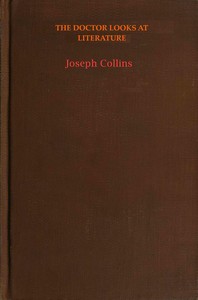The doctor looks at literature : Psychological studies of life and letters
"The Doctor Looks at Literature: Psychological Studies of Life and Letters" by Joseph Collins is a collection of psychological essays written in the early 20th century. This work analyzes various literary figures through the lens of modern psychology, particularly focusing on how psychological concepts manifest in their works and characters. The book is likely intended for readers interested in the intersection of psychology and literature, as it explores how authors like James
Joyce and Dostoevsky express complex human behaviors, emotions, and motivations through their writing. At the start of this volume, Collins sets the foundation for a discussion on the role of psychology in fiction, asserting that true understanding of human life is best captured through literature rather than psychological theory alone. He emphasizes that psychology should serve as a tool for writers to better represent the inherent complexities of life instead of replacing the creative instincts that drive their narratives. Through an examination of how authors depict psychological nuances, Collins invites readers to consider the rich interplay between human consciousness and the literary expression of experience, foreshadowing detailed analyses of various renowned writers and their psychological insights throughout the book. (This is an automatically generated summary.)
Read or download for free
| How to read | Url | Size | |||
|---|---|---|---|---|---|
| Read now! | https://www.gutenberg.org/ebooks/75230.html.images | 622 kB | |||
| EPUB3 (E-readers incl. Send-to-Kindle) | https://www.gutenberg.org/ebooks/75230.epub3.images | 2.3 MB | |||
| EPUB (older E-readers) | https://www.gutenberg.org/ebooks/75230.epub.images | 2.3 MB | |||
| EPUB (no images, older E-readers) | https://www.gutenberg.org/ebooks/75230.epub.noimages | 382 kB | |||
| Kindle | https://www.gutenberg.org/ebooks/75230.kf8.images | 2.8 MB | |||
| older Kindles | https://www.gutenberg.org/ebooks/75230.kindle.images | 2.7 MB | |||
| Plain Text UTF-8 | https://www.gutenberg.org/ebooks/75230.txt.utf-8 | 582 kB | |||
| Download HTML (zip) | https://www.gutenberg.org/cache/epub/75230/pg75230-h.zip | 2.4 MB | |||
| There may be more files related to this item. | |||||
Similar Books
About this eBook
| Author | Collins, Joseph, 1866-1950 |
|---|---|
| LoC No. | 23009645 |
| Title | The doctor looks at literature : Psychological studies of life and letters |
| Original Publication | New York: G.H. Doran, 1923. |
| Note | Reading ease score: 55.8 (10th to 12th grade). Somewhat difficult to read. |
| Contents | Psychology and fiction -- Ireland's latest literary antinomian: James Joyce -- Feodor Dostoievsky: tragedist, prophet, and psychologist -- Dorothy Richardson and her censor -- Marcel Proust: master psychologist and pilot of the "vraie vie" -- Two literary ladies of London: Katherine Mansfield and Rebecca West -- Two lesser literary ladies of London: Stella Benson and Virginia Woolf -- The psychology of the diarist: W.N.P. Barbellion -- The psychology of the diarist: Henri-Frédéric Amiel -- Georges Duhamel: poet, pacifist, and physician -- Even yet it can't be told: the whole truth about D.H. Lawrence -- The joy of living and writing about it; John St. Loe Strachey -- The King of Gath unto his servant: magazine insanity. |
| Credits | Andrés V. Galia, Thiers, MaryFT and the Online Distributed Proofreading Team at https://www.pgdp.net (This book was produced from images made available by the HathiTrust Digital Library.) |
| Language | English |
| LoC Class | PN: Language and Literatures: Literature: General, Criticism, Collections |
| Subject | Literature, Modern -- 19th century -- History and criticism |
| Subject | Literature, Modern -- 20th century -- History and criticism |
| Subject | Authors -- Psychology |
| Subject | Psychological fiction -- History and criticism |
| Category | Text |
| EBook-No. | 75230 |
| Release Date | Jan 28, 2025 |
| Copyright Status | Public domain in the USA. |
| Downloads | 344 downloads in the last 30 days. |
| Project Gutenberg eBooks are always free! | |


